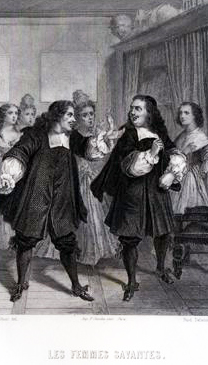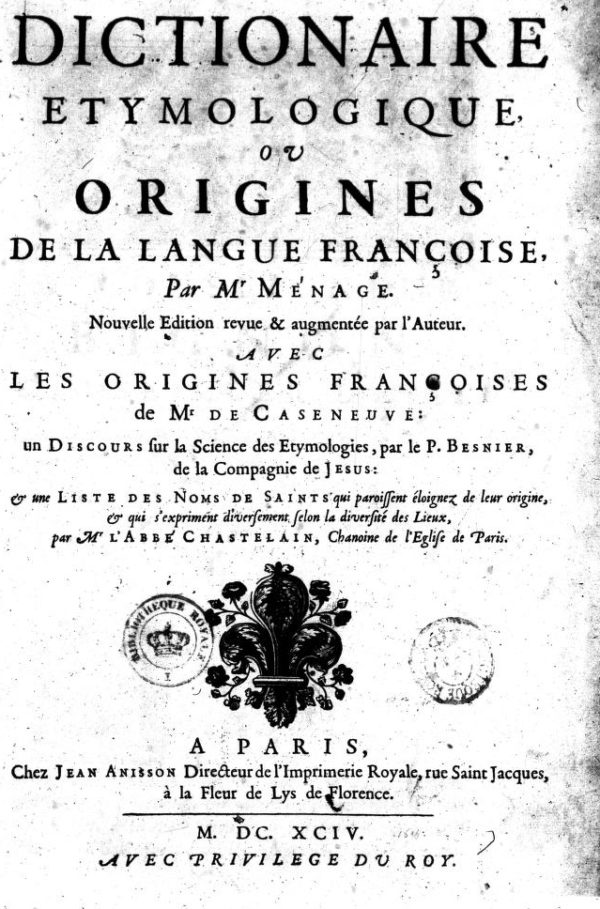When audiences laughed at the pedant Vadius in Molière’s The Learned Ladies (1672), those in the know recognized Ménage shouting at a rival, “I defy you in verse, prose, Greek, and Latin.”

Vadius (Ménage) and Trissotin (L’abbe Charles Cotin) argue in Molière’s The Learned Ladies. Steel engraving by Gustave Staal (nd).
When audiences laughed at the pedant Vadius in Molière’s The Learned Ladies (1672), those in the know recognized Ménage shouting at a rival, “I defy you in verse, prose, Greek, and Latin.”
Despite the satire, Menage was a well-regarded scholar, and to him goes the honor of first acknowledging piquenique (as he spelled it) as a legitimate French word.
Menage did not know that during the War of the Fronde, an anonymous broadside satirizing a musketeer (probably) appeared in Paris. His name is Pique-Nique, a pseudonym for implying someone ostentatious or gross, who, like his gourmandish comrades, had given up their arms for the pleasure of eating and drinking. Their club, les frères de Bacchique de Pique-Nique, was mockery of gallantry and manly combat.
Though the satire immediately fizzled in the year it was published, 1649, and the man and his company of gourmands disappeared, the word piquenique gained currency as a spoken word. It was unknown in print and private correspondence until almost five decades later, Ménage published it in his French dictionary, defined as an eating custom. The 1694 Dictionnaire Du Etymologique De La Langue Françoise became a standard, and Menage’s definition of piquenique became authoritative and lasting among the French.
PIQUENIQUE Nous disons faire un repas à piquenique pour dire faire un repas où chacun paye son écot ce que les Flamans disènt parte vital chacun fa part. Ce mot n eft pas ancien dans notre Langue & il eft inconnu dans la pluspart de nos Provinces.
Etymology for piquenique is scanty. The definition of un repas piquenique is might be based on Menage’s first-hand experience of cost-sharing among his circle of intellectuals, authors, and aristocrats. He correctly presumed the word piquenique was recent in Paris but not in the provinces. He did not know of Pique-Nique or his bacchic comrades. He was unaware that sharing was a part of their code: “chacun en paysant sa dépense.” And he wrongly suspected piquenique’s origin might be Flemish (les Flamans) and related piquenique to the expression, “parte betal, chacun sa part,” each pays his part because this was the chief aspect of un repas piquenique.
Where un repas piquenique takes place is unspecified. Ménage makes no mention though it is implicitly understood to be indoors because, for the next few centuries, this is how the French understood un repas piquenique; it was always indoors in salons, dining rooms, or restaurants. Ménage’s piquenique is always a gathering where participants usually share costs or supply food and drink.
Typically, the French have, until recently, used another phrase for a picnic. For example, Jean-Antoine Watteau’s version of a picnic is titled La Collation (1721c), Édouard Manet’s is Le déjeuner sur l’herbe (1863), and Fernand Leger’s is La partie de champagne (1952). J-J. Rousseau’s Emile (1762) describes alfresco dining as un festin. Jean Renoir’s Partie de campagne (1946) is based on Guy De Maupassant’s Une partie de campagne (1881): his Le déjeuner sur l’herbe (1959) is an allusion to Manet’s painting.
See Ménage, Gilles. Dictionnaire Du Etymologique De La Langue Françoise. 2 vols. Paris: Chez Jean Anisson, 1694; Molière, The Intellectual Ladies, Les femmes savantes, translated by Wallace Fowlie, In Five Classic French Plays. New York: Dover Books, 1997; Richard G. Maber. Publishing in the Republic of Letters: The Menage-Graevius-Wetstein Correspondence 1679-1692. Amsterdam: Rodopi, 2005.

